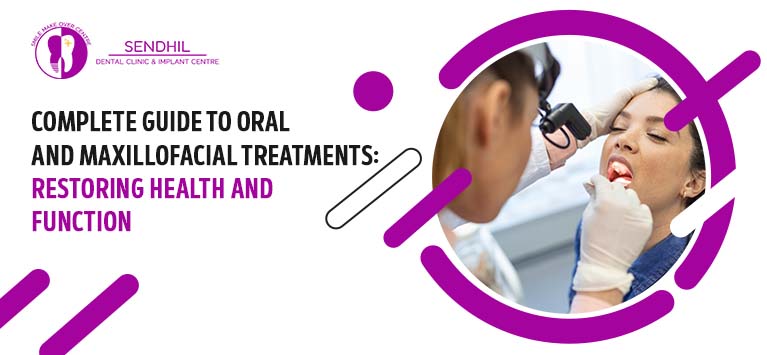
Complete Guide to Oral and Maxillofacial Treatments: Restoring Health and Function
Oral and maxillofacial surgery is a specialty of medicine that treats diseases, injuries, and functional and cosmetic issues of the face and skull. Its area of action is quite broad, ranging from the excision of tumors and cysts to the repair of bone structures or the restoration of the functionality of the lips and other facial features.
What is Oral and Maxillofacial surgery?
Initially specialized in the treatment of malformations and post-traumatic craniofacial pathological malocclusions, Oral and Maxillofacial surgery has expanded its field of action to pathologies and traumas of the face and skull. It is confirmed as one of the most complex and complete specializations in the panorama of medicine, as it is necessary to have in-depth knowledge of aesthetic medicine, dentistry, neurosurgery, ophthalmology, and otorhinolaryngology.
Part of the initial mission of the discipline has remained in the name maxillo, in reference to the maxillary function, so much so that in some countries, such as Canada and the United States, it represents a specialization in the dental field. Oral and Maxillofacial surgery, to date, deals not only with the problems of the jaw-jaw complex but also with cosmetic surgery operations ( otoplasty, blepharoplasty, rhytidectomy, rhinoplasty, etc.), operations in the oncological field (removal of tumors and cysts of the oral cavity and face) and reconstruction and functional modification interventions ( cleft lip and other congenital malformations).
What does Oral and Maxillofacial surgery cure?
The pathologies and conditions treated by Oral and Maxillofacial surgery are:
- Neoplastic pathologies of the cervico-maxillofacial district (Carcinomas of the oral cavity, tongue, buccal floor, paranasal sinuses, salivary glands, epidermis)
- Maxillofacial reconstructive surgery (Grafts, pedicled and free flaps)
- Surgical therapies for dysembryoplasia of dental origin
- Orthodontic surgery (Interventions, complications, and relapses on mandibular and maxillary disorders)
- Traumas of the maxillofacial area (Fractures and facial traumas)
- Pre-prosthetic surgery (bone grafts)
- Neoplastic bone pathologies (odontogenic and non-odontogenic tumors)
- Non-neoplastic bone diseases (dysplastic and dystrophic lesions, Paget’s disease, neovascular dysplasia, etc.)
- Oral and Maxillofacial malformations.
Diagnostic tests in Oral and Maxillofacial surgery
The diagnostic tests used in the field of Oral and Maxillofacial Surgery are numerous and linked to the specific pathology or trauma in question. Given the wide range of action in the discipline, the diagnostic tests are equally varied and can be summarized as follows:
- Nuclear magnetic resonance
- Radiography
- Echo Doppler
- Ultrasound
- CT scan, computed tomography
- Electrocardiogram
- Blood tests
- Main vital signs (blood pressure, pulse)
- Initial history
How is Oral and Maxillofacial surgery performed, and how long does it take?
Oral and Maxillofacial surgery operations generally require an equipped operating room or a properly organized dental office due to the complexity of the operations and the risks for the patient. The complexity of the intervention is linked to the type of pathology or trauma in question and can vary from small interventions lasting a few minutes under local anesthesia to complex interventions lasting hours and the need for a specialized support team.
Even the rehabilitation phases are linked to the complexity of the intervention and can involve long periods of hospitalization or a sudden recovery within the same day. The invasiveness of the interventions has a variability linked to the type of operation.
Oral and Maxillofacial surgery: recovery times
Recovery times from Oral and Maxillofacial surgery depend on several factors. The first is certainly the degree of complexity of the operation, and the second factor is the patient’s physical response, which is always subjective.
However, to date, the full recovery time from Oral and Maxillofacial surgery is, on average, between 14 and 60 days.
In particular, the stitches are removed after 7 days by excision of small mucous and skin lesions, and after 15 days, you will observe complete healing.
If the lesions are larger, the sutures are removed after 15 days, and 3 to 6 weeks are required for complete healing.
As far as tooth extractions are concerned, if the patient follows the instructions and the clot remains stable in the first days after having removed the tooth, healing takes between 2 and 3 weeks.
More time is needed at the bone level. So if, for example, it is necessary to place an implant where a tooth has been removed, they generally wait between 5 and 6 weeks before taking an X-ray to evaluate the healing and plan the intervention.
If cysts are removed, healing basically depends on the size of the lesion.
Also, in this case, the superficial healing of the mucosa is rapid; after a period between 7 and 15 days, the mucosa appears normal. Underbone healing can also take months if the lesion is very extensive.
As far as fractures are concerned, which are practically never treated on an outpatient basis, if necessary, the fracture is reduced, and osteosynthesis plates are placed, or the jaw is blocked by tying the teeth above and below. Normally the healing times are between 4 and 8 weeks.
As far as implant surgery is concerned, the discomfort can last from 1-3 days in the simplest cases to a maximum of 2-3 weeks in the most complex cases in which regenerations or sinus lifts are performed. Here too, the sutures are removed after 7 or 14 days, while deep healing takes months. From 3 to 6 months for the osseointegration of the implants to 8-9 months for the complete healing of large bone regenerations.
Lastly, as regards operations on the temporomandibular joint, the most frequent operation by far is arthrocentesis, which consists of washing the joint which is performed to remove toxins and “debris” from the joint capsule with a solution containing anti-inflammatories and lubricants, the relief is practically immediate, and there is no post-operative.
Risks and complications
Oral and Maxillofacial surgery performs operations considered safe and with reduced risks but also operates in complex conditions, such as, for example, as a result of a serious trauma, where the risks increase exponentially.
The generic risks associated with Oral and Maxillofacial surgery are:
- Edemas
- Ecchymosis
- Infections
- Chronic pain
The specific risks, on the other hand, are linked to the type of intervention performed and are:
- Risk of nerve injury
- Atelectasis
- Formation of blood clots
- Bleeding
The risks also include more important consequences, such as sepsis and death of the patient, although they represent a risk common to almost all interventions, especially those with greater invasiveness.
In Conclusion
Oral and Maxillofacial surgery emerges as a dynamic field with the ability to transform lives through intricate procedures and advanced techniques. From addressing pathologies to reconstructing bone structures, the comprehensive scope of this discipline reflects its importance in restoring health, function, and confidence.
As you journey through the realm of Oral and Maxillofacial surgery, remember that each case holds unique complexities. Relying on the expertise of trained professionals is paramount. With a comprehensive understanding of diagnostics, surgical techniques, and recovery processes, professionals in this field ensure optimal outcomes. Trust in their guidance for a safe and effective path toward restoration and well-being.



